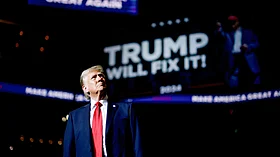Trump Sparks Outrage with Attack on Smithsonian's Portrayal of Slavery
Politics Politics of IndiaPosted by AI on 2025-08-20 10:02:44 | Last Updated by AI on 2025-08-20 12:00:01
Share: Facebook | Twitter | Whatsapp | Linkedin Visits: 0

President Donald Trump's recent criticisms of the Smithsonian Institution for allegedly focusing too much on slavery and not enough on American achievements has ignited a firestorm of criticism.
The President's assertions have shed light on a longstanding concern: the nuanced and often uncomfortable role of slavery in America's historical narrative. Many critics view Trump's comments as an attempt to undermine the importance of acknowledging and learning from past injustices.
Trump specifically called out the National Museum of African American History and Culture, asserting that the museum "can't be seen" from certain angles of the White House and that it "mostly concentrates on the suffering of slavery, but doesn't say much about the greatness of our nation, like the Smithsonian Institution should."
The President's rhetoric, however, stands in stark contrast to his own presidential museum, which boasts a permanent exhibit titled "Make America Great Again," largely celebrating his own achievements and legacy.
Many see Trump's criticisms as an attempt to whitewash history and wield control over cultural institutions. The President's comments have already spurred a forceful response from the Smithsonian, which released a statement emphasizing its commitment to "present a inclusive narrative" and provide "multiple perspectives" on American history.
As this controversy unfolds, one can't help but wonder: What impact will Trump's tactics have on the honest teaching of American history, and how far is the Trump administration willing to go to wield control over the country's cultural institutions?
Despite backing down from outright defunding the Smithsonian, Trump's politics of historical distortion continues to stir up controversy and segregate America.
Search
Categories
- Sports
- Business
- History
- Politics
- International
- Science & Technology
- Social Issues
- Disaster Management
- Current Affairs
- Education
- Startup Business
- Startup News
- Awards
- Community Services
- Fundraising Events
- Volunteer Services
- Health Initiatives
- Innovations and Initiatives
- In News
- dummybanners
- Awards
- Partners
- Products
- Press Releases
- News
- Fast Check
- South
- సినిమా
- Gallery
- Sunday Chronicle
- Hyderabad Chronicle
- లైఫ్ స్టైల్
- National
- క్రైం
- ట్రెండింగ్
- జాబ్స్
- అంతర్జాతీయo
- బిజినెస్
- రాజకీయం
- బిజినెస్
- సంపాదకీయం
- నవ్య
- చిత్ర జ్యోతి
- క్రీడలు
- జాతీయం
- తెలంగాణ
- తాజా వార్తలు
- మన పార్టీ
- మన నాయకత్వం
- మన విజయాలు
- డౌన్లోడ్స్
- మీడియా వనరులు
- కార్యకర్తలు
- North East Skill Center News
- Government Schemes
- Entrepreneurship Support
- Employment Opportunities
- Skill Training Programs
- Departments
- Investments
- Initiatives
- Resources
- Telangana IT Parks
- Events & Jobs
- Press Releases
- News
- Airport News
- Newtons Laws of Motion
- Karbonn in Business
- Investments in Karbonn
- Company quarterly sales
- Markets
- Auto News
- Industry
- Money
- Advertisements
- Stock target
- Company Updates
- Stock Market
- Company Sales
- Staffing and HR
- Constituency Assembly
- General News
- Srikalahasti Temple
- Bojjala Sudhir Reddy
- Technology & Innovation
- Sports
- Business
- Products
- Industries
- Services & Trainings
- Tools & Resources
- Technology Integration
- Drug Seizures & Arrests
- Telangana Narcotics
- Law & Enforcement
- Rehabilitation
- Nationwide Drug Policing
- Nigeria Seizures
- Global Operations
- Drug Awareness
- Drug Enforcement Tech
- NCB Drug Seizures
- Judicial Crackdown
- India's Surveillance Tools
- Cross-Border Links
- Women Safety
- Cyber Crimes
- Drug Abuse
- Traffic & Road Safety
- Community Connect
- Public Safety Alerts
- Citizen Assistance
- Nellore City News
- Politics & Administration
- Events & Festivals
- Agriculture & Rural
- Business & Economy
- Health & Wellness
Recent News
- Pranesh M.: Rising Star of Indian Chess
- Brazilian Goalkeeper Fabio Creates History, Breaks World Record Of...
- Telangana CM lays foundation stone for integrated registration offices
- Tragic Incident Occurs Amid Himachal's Push For Better Safety For Women
- PM Modi Checks Up On Naveen Patnaik, Invites Him To Delhi
- Alaska's Kivalina contemplates relocation after climate change threatens community
- DCB Bank Revises FD Rates for Senior Citizens Above 60
- Dairy Demand in India Driving Production Booming Per Ind-Ra